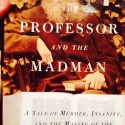-
Over the last few years I’ve had an uncomfortable sense that someone, or something, has been tinkering with my brain …
-
Must a person speak a language to understand it?
This is an important question to ask for instructors of ancient languages who want to move toward communicative approaches to language instruction, and the answer to this question is: no. This doesn’t necessarily rule out that we should use communication in ancient language instruction (though for this and a number of other reasons I wouldn’t),…
-
With lexicographers you really just never can tell

-
“Does one plus one make one?”
-
Seeking value from serendipity: Eco, Ruse, Haidt
In his wonderful little book Serendipities: Language and Lunacy, Umberto Eco explores the power of false ideas. In the preface of the book he states concerning the first essay of the collection: The polemical title is “The Force of Falsity,” and in the lecture I wanted to show how a number of ideas that today…
-
The Man who Mistook his Wife for a Hat meets Memory: A Very Short Introduction
This is a short review of the book Permanent Present Tense: The Unforgettable Life of the Amnesic Patient, H. M. by Suzanne Corkin. The title of the post gives my one sentence summary for those familiar enough with books on psychology. Permanent Present Tense has two primary characteristics that make it a worthwhile read. First,…
-
The 10 book meme – my version
This is my version of the meme going around on Facebook (not that anyone asked) to name 10 books that have stuck with you without thinking too much about it: Ecclesiastes – unknown Night – Elie Wiesel The Hound of the Baskervilles – Arthur Conan Doyle Introduction to Christianity – Joseph Ratzinger (or Truth Tolerance…
-
“Holocaust” as translation value
The best SBL presentation I attended this year, hands down, was by Shira Leibowitz Schmidt. It was entitled “Translating Biblical Verses in Rabbinic Holocaust Memoirs.” One of the particular translation values she talked about was “holocaust” for some words that many modern Bible translations render as “whole burnt offering.” Many Holocaust survivors dislike “holocaust” as…
-
Elie Wiesel and When the Meanings Don’t have Words
I, too, have recently adopted the mantra “words don’t have meanings; meanings have words.” But, I was struck recently by this passage in the preface of Night by Elie Wiesel where he discusses how there were no words appropriate for the meanings he was trying to convey concerning his experiences during the Holocaust: I had…
-
Review of Knowing Jesus Through the Old Testament
For those of you who might be interested, I’ve posted a review of Knowing Jesus Through the Old Testament over at Unsettled Christianity. It’s a good read, and not overbearing in length if you are interested in the topic. The style is also very readable.